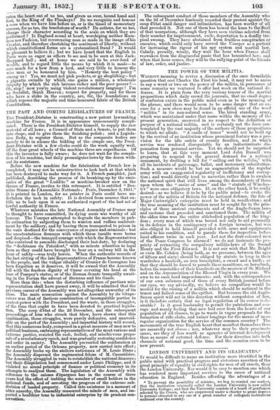THE PAST AND COMING LEGISLATURES OF FltANCE.
THE President-Dictator is constructing a new patent lawmaking machine for France. It is in appearanoe unnecessarily compli- cated. There isthe President-Dictator himself, to supply the raw material of all laws ; a Council of State and a Senate, to put them into shape, and to give them the finishing polish ; and a Legisla- tive Body, to register them. But as the composite bodies are merely to do in silence the bidding of the - simple one, the Presi- dent-Dictator with a few clerks could do the work equally well. Of the four great wheels of the machine three are superfluous. Of this the inventor is fully aware; he does not wait for the comple- tion of his machine, but daily promulgates laws by the dozen with- out its assistance.
Before the new machine for the fabrication of French law is completed, it may not be uninstructive to look back at that which has been destroyed to make way for it. A French pamphlet, just published, describing the process of its breaking-up by the emis- saries of the great " Luddite " or machine-breaker now on the throne of France, invites to this retrospect. It is entitled " Der- niere Seance de l'Assemblee Nationale ; Paris, December 2, 1851." It is printed in London, for no printer in Paris could have un- dertaken the task in safety. It is derived from sources that en- title us to look upon it as an authorized report of the last act of lawful authority in France.
Whatever mistakes the late National Assembly of France may be thought to have committed, its dying scene was worthy of all honour. The Usurper attempted to degrade the members in pub- lic estimation by subjecting them to wanton and ruffian maltreat- ment by the soldiery, and by-having them transported to prison in the vans destined for the conveyance of rogues and criminals : but the unostentatious firmness with which these insults were borne and despised—the tranquil courage with which the Representatives who contrived to assemble discharged their last duty, by declaring the " decheanee du President," with as minute attention to legal form as they could have brought to bear on a railway bill in the hour of safety—was truly heroic. 'When the authentic records of the last sitting of the late Representatives of France become known to the people, and the vulgar ribaldry of Granier de Cassagnao has been forgotten as it deserves, it will be owned that the Assembly fell with the fearless dignity of Comr covering his head at the base of Pompey's statue, or of the Roman Senate tranquilly await- ing in the Forum the advent of Brennus and his Gauls.
More than this : when the disturbing influence of partisan mis- representation shall have passed away, it will be admitted that the previous career of the Assembly was not altogether unworthy of its close. The main accusation against the Assembly by its vitupe- raters was that of factious combination of incompatible parties to contest power with the President, and the waste, in those struggles, of the time that ought to have been devoted to practical legisla- tion. The coup d'etat of the 2d December, and the subsequent proceedings of him who struck that blow, have shown that this combination, those struggles, were purely defensive, and unavoid- able on the part of the Assembly; and impartial history will record, that this numerous body, composed in a great measure of men new to political business, embracing representatives of the most various and extreme parties, resisted the rash, foolish, and mischievous propo- sals of a revolutionaryepoch, and was gradually restoring confidence and order in society. The Assembly prevented the confiscation at an earlier period of the Orleans property, now carried into effect ; the Assembly broke up the ateliers nationaux of M. Louis Blanc ; the Assembly dispersed the regimented felons of M. Caussidiere. The Assembly struggled in vain to reestablish the national finances ; but their dilapidation had commenced under Louis Philippe, and it -violated no sound principle of finance or political economy in its attempts to readjust them. The legislation of the Assembly with reference to the caisses d'epargnes has in the course of three years had the effect of trebling the number of small holders in the national funds, and of arresting the progress of the extreme sub- division of landed property. Called into existence in a moment of utter anarchy, the Assembly reassured the minds of men, and im- parted a healthier tone to industrial enterprise by its prudent con- servatism. The subsequent conduct of those members of the Assembly who on the 2d of December fearlessly recorded their protest against the coup d'etat amid danger and intimidation, has been worthy of all that preceded it. Not one of them has bowed the knee to the Baal of that usurpation, although they have seen victims selected from their number for imprisonment, exile, deportation to a deadly tro- pical swamp. They have abstained from fruitless conspiracies or emeutes, which could only have served the Usurper as a pretext for increasing the rigour of his spy system and martial law. Calmly, proudly-, wisely, they wait the hour when France shall reawaken from the disgraceful panic that has benumbed her; and when that hour comes, they will be the rallying-point of the friends of law, order, and justice.


























 Previous page
Previous page